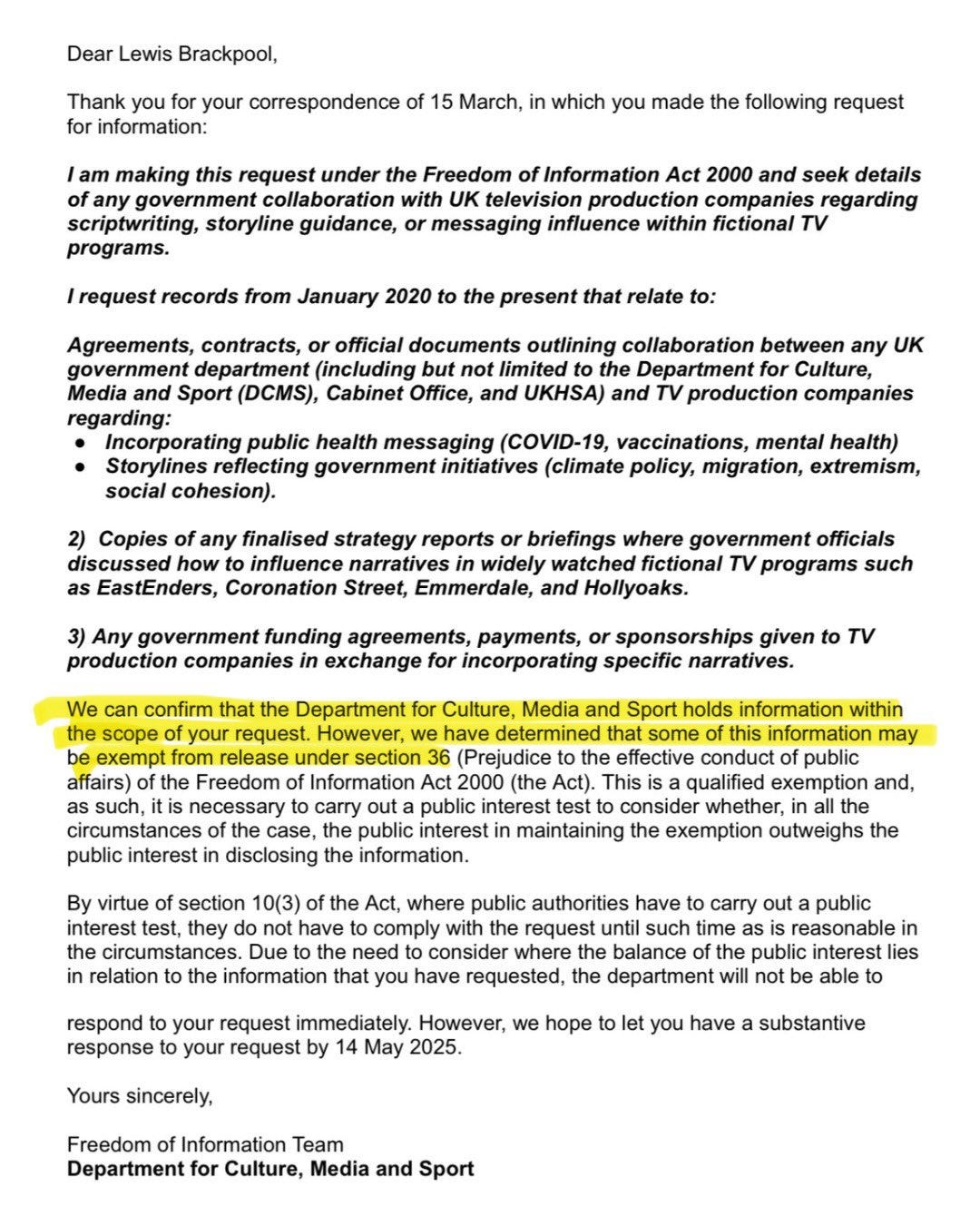How The British State Pushes Narratives Through Fictional TV Programs
The UK government has been scripting more than just policy — it's been scripting entertainment too.
A conversation on the phone with a close friend, Charlie Sansom, in which he exclaimed that, while watching a particular soap opera, one of the characters mentioned ‘climate intervention’ and ‘geo-engineering’ completely out of pocket and at random, inspired me to push the government to confirm whether the state does, in fact—through its Department for Culture, Media and Sport—promote government-approved narratives through fictional television storylines and plots.
Over the decades, many have suspected that storyline narratives have been poisoned with government-injected messaging, ranging from climate change to public health and even extremism. The British state simply cannot keep its hands off the entertainment industry. On the other hand, this is somewhat to be expected; millions across the nation are still (oddly) infatuated with soap operas such as EastEnders, Coronation Street, Hollyoaks, and the like, making them their prime source of evening entertainment after a long day of work. My judgment isn’t necessarily about watching these types of programmes, but about the content pushed within them.
During the COVID-19 era, when a large portion of the British public was questioning the experimental mRNA injection, EastEnders ran a segment mocking people who were rightly concerned about the lack of long-term data. Through a narrative scripted with the help of a government department, the message was clear, any dissent or questions were to be viewed as ‘low-intelligence’ and benign.
In the segment, a woman walks into a corner shop and overhears a conversation between two characters. They express relief at having received the vaccine and share their positive experiences. The woman interrupts, calling those who take it ‘lab rats,’ claiming there’s no long-term data, and declaring, “I’d never put that stuff in my body—it could be dangerous.” She then asks for a packet of cigarettes—an obvious tongue-in-cheek mockery of health sceptics who, as it turns out, were later vindicated in several ways.
Other state-pushed narratives in fictional television include anti-white messaging. A recent example is the hit series Adolescence, which tells the story of a 13-year-old white child accused of stabbing a girl to death. SurreyLive reports: “The 51-year-old who co-wrote the show with Jack Thorne said, ‘Where it came from, for me, is there was an incident in Liverpool, a young girl, and she was stabbed to death by a young boy. I just thought, why?’” He also cited the tragic death of schoolgirl Elianne Andam, 15, who was killed by Hassan Sentamu after she got off a bus outside the Whitgift Centre on her way to Old Palace of John Whitgift School in Croydon.
I submitted a Freedom of Information (FOI) request on the 15th March asking for any agreements, contracts, or official documents outlining collaborations between any UK government department and TV production companies regarding the incorporation of public health messaging and storylines reflecting government initiatives—such as climate policy, migration, extremism, and social cohesion.
“We can confirm that the Department for Culture, Media and Sport holds information within the scope of your request,” the department reluctantly replied. “However, we have determined that some of this information may be exempt from release under Section 36 (prejudice to the effective conduct of public affairs).”
I discussed this in more detail with friends Harrison Pitt and Connor Tomlinson on their joint show, Deprogrammed by The New Culture Forum.



This was one of my many reasons for demanding the return of my TV licence money and getting it in 2014.
Oh, how noble of government to turn our TV binges into their personal propaganda playground, subtly scripting our thoughts with every laugh track and plot twist.
Easterners meets 1984.